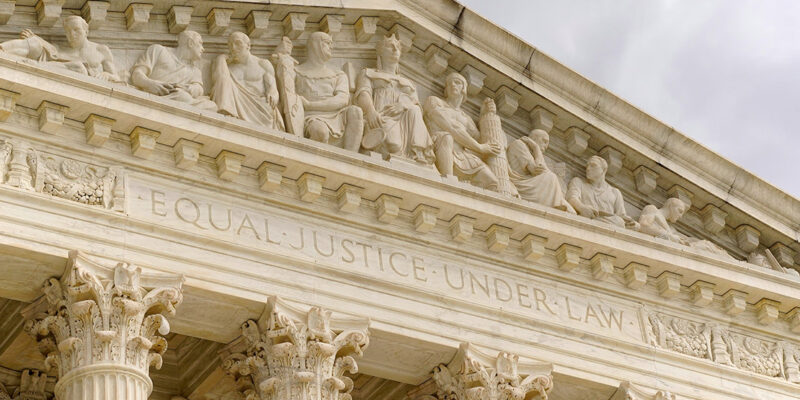Supreme Court Term 2023-2024
We’re breaking down the cases we've asked the court to consider this term.
Latest Case Updates
Ongoing
Updated November 21, 2024
Ongoing
Updated November 20, 2024
Ongoing
Updated November 4, 2024
Ongoing
Updated October 31, 2024
Featured
Georgia
Nov 2024
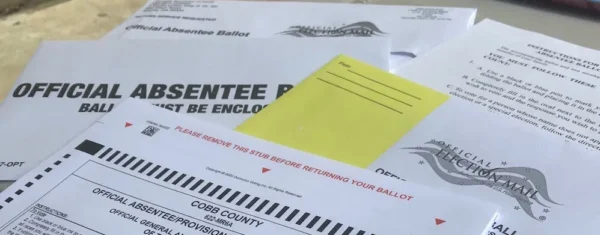
Voting Rights
Ayota v. Fall
On October 31, 2024, just five days before the November 5 General Election, Cobb County announced that it had failed to send more than 3,000 absentee ballots to Cobb County voters who had timely requested them. Many of these voters are at school hundreds of miles away or have disabilities that make it all but impossible to vote in person. The ACLU and co-counsel sued on behalf of affected voters to ensure that they would not be disenfranchised because of the County's administrative error.
U.S. Supreme Court
Oct 2024
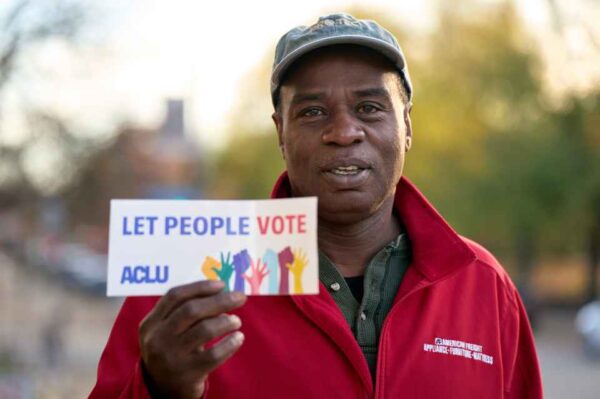
Voting Rights
Republican National Committee v. Genser
Voters in Butler County, Pennsylvania made a mistake in voting their mail ballots in the April 2024 primary election, forgetting to use the required secrecy envelope. Because their mail ballots could not be counted, they went to the polls in Election Day and voted provisional ballots. The County later determined that it would not count their provisional ballots, and the voter’s appealed, arguing that Pennsylvania law requires that when an eligible voter attempts to vote by mail but the mail ballot is rendered void due to some defect like lacking a secrecy envelope, the eligible voter may cast a provisional ballot and have that ballot counted notwithstanding the failed attempt to vote by mail.
Georgia
Oct 2024

Voting Rights
Eternal Vigilance Action, Inc. v. Georgia
The ACLU and partner organizations have sought to intervene in this case to represent the rights of voters and voting-rights organizations in a case challenging a number of rules passed by the Georgia State Election Board. We challenge a rule that requires that the number of votes cast be hand counted at the polling place prior to the tabulation of votes. This rule risks delay and spoliation of ballots, putting in danger voters’ rights to have their votes count.
Texas
Oct 2024
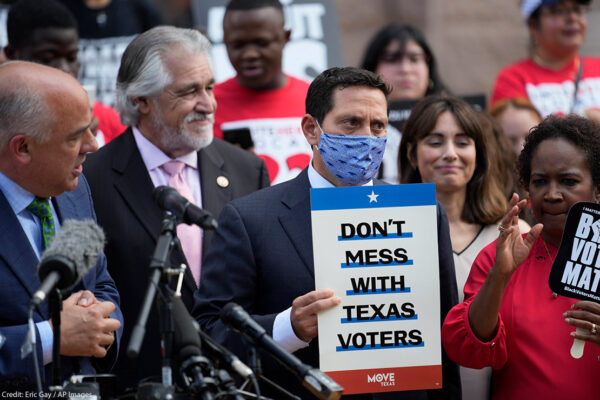
Voting Rights
OCA-Greater Houston v. Paxton
Texas has growing Hispanic and Black populations that helped propel record voter turnout in the November 2020 election. The Texas Legislature responded to this increased civic participation with an omnibus election bill titled Senate Bill 1—SB 1 for short—that targeted election practices that made voting more accessible to traditionally marginalized voters like voters of color, voters with disabilities, and voters with limited English proficiency. Since 2021, SB 1 has resulted in tens of thousands of lawful votes being rejected, and it remains a threat to democracy in Texas.
Michigan
Sep 2024
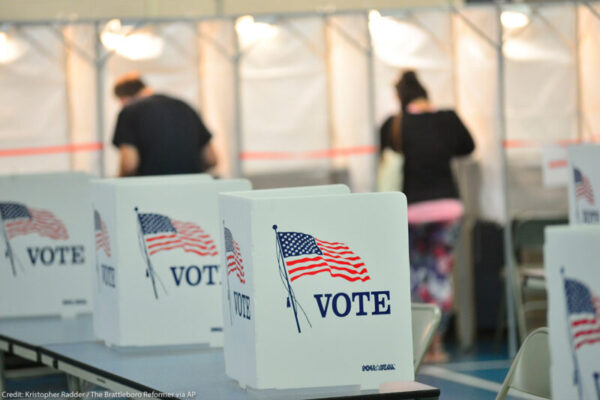
Voting Rights
ACLU of Michigan v. Froman
Michigan requires boards of county canvassers to certify the results of an election within 14 days after the election based on the total number of votes reported from each location. The law doesn't allow them to withhold certification. Kalamazoo Board of County Canvassers member, Robert Froman, has made clear that he would decline to certify the November 2024 election under certain circumstances. This lawsuit asks the state's courts to make clear that Mr. Froman is duty bound to certify the election based on the number of votes reported.
Ohio
Sep 2024

Reproductive Freedom
Planned Parenthood Southwest Ohio Region et al., v. Ohio Department of Health, et al.
The American Civil Liberties Union, the ACLU of Ohio, Planned Parenthood Federation of America, the law firm WilmerHale, and Fanon Rucker of the Cochran Law Firm, on behalf of Planned Parenthood Southwest Ohio Region, Planned Parenthood of Greater Ohio, Preterm-Cleveland, Women’s Med Group Professional Corporation, Dr. Sharon Liner, and Julia Quinn, MSN, BSN, amended a complaint in an existing lawsuit against a ban on telehealth medication abortion services to bring new claims under the Ohio Reproductive Freedom Amendment, including additional challenges to other laws in Ohio that restrict access to medication abortion in the state.
U.S. Supreme Court
Sep 2024

Voting Rights
Callais v. Landry
Whether the congressional map Louisiana adopted to cure a Voting Rights Act violation in Robinson v. Ardoin is itself unlawful as a gerrymander.
Ohio
Jul 2024
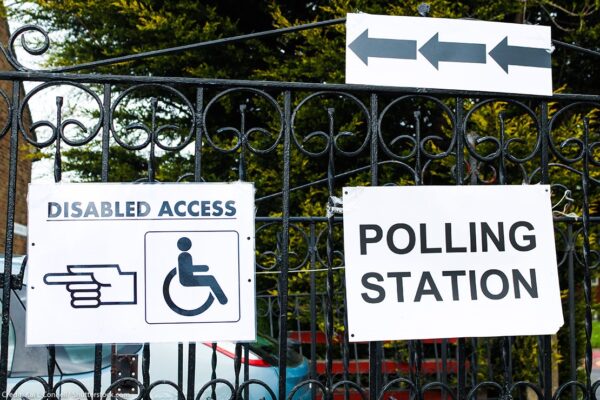
Voting Rights
League of Women Voters of Ohio v. LaRose
In Ohio, HB 458 makes it a felony for any person who is not an election official or mail carrier to return an absentee voter's ballot—including voters with disabilities—unless the person assisting falls within an unduly narrow list of relatives. We are challenging the law because it violates Section 208 of the Voting Rights Act (VRA) and the American with Disabilities Act (ADA) by making it exceedingly difficult for voters with disabilities to cast their ballots.
U.S. Supreme Court
Apr 2024

Reproductive Freedom
Idaho and Moyle, et al. v. United States
Idaho and Moyle, et al. v. United States was appealed to the U.S. Supreme Court by Idaho politicians seeking to disregard a federal statute — the Emergency Medical Treatment and Labor Act (EMTALA) — and put doctors in jail for providing pregnant patients necessary emergency medical care. The Supreme Court heard oral arguments on this case on April 24, 2024. The Court’s ultimate decision will impact access to this essential care across the country.
All Cases
1,496 Court Cases
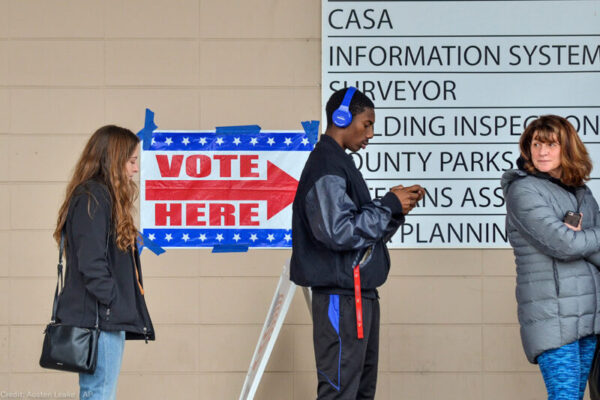
New Hampshire
Sep 2024
Voting Rights
Coalition for Open Democracy v. Scanlan
This lawsuit challenges HB 1569, a new law that will make New Hampshire the only state to require every person to produce documentary proof of citizenship when they register to vote for both state and federal elections. It also challenges HB 1569’s elimination a preexisting protection for voters—namely, an affidavit option that allowed voters who faced surprise challenges to their eligibility at the polls to swear to their qualifications and cast a ballot. Accordingly, HB 1569 violates the First and Fourteenth Amendments of the U.S. Constitution by placing substantial burdens on New Hampshirites at all stages of the voting process, and will arbitrarily disenfranchise hundreds, if not thousands of qualified voters.
Explore case
New Hampshire
Sep 2024

Voting Rights
Coalition for Open Democracy v. Scanlan
This lawsuit challenges HB 1569, a new law that will make New Hampshire the only state to require every person to produce documentary proof of citizenship when they register to vote for both state and federal elections. It also challenges HB 1569’s elimination a preexisting protection for voters—namely, an affidavit option that allowed voters who faced surprise challenges to their eligibility at the polls to swear to their qualifications and cast a ballot. Accordingly, HB 1569 violates the First and Fourteenth Amendments of the U.S. Constitution by placing substantial burdens on New Hampshirites at all stages of the voting process, and will arbitrarily disenfranchise hundreds, if not thousands of qualified voters.
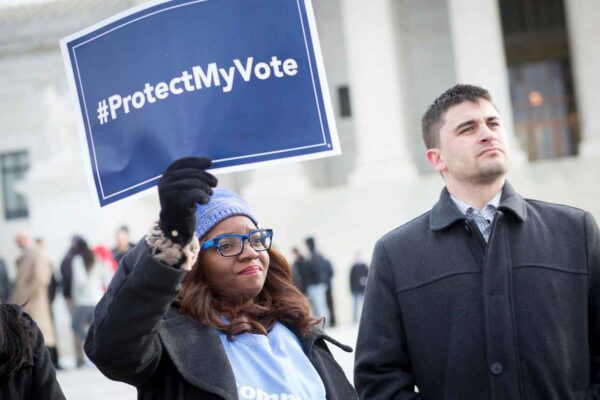
U.S. Supreme Court
Sep 2024
Voting Rights
Pennsylvania State Conference of the NAACP v. Schmidt
In November 2022, thousands of Pennsylvania voters were denied the right to vote based on a meaningless paperwork error. They filled out their mail ballots, signed the form on the outer return envelope, and returned their ballots on time. Yet their ballots were not counted, because they either forgot to write the date on their return envelope, or they accidentally wrote the wrong date. The Civil Rights Act prohibits states from disenfranchising voters based on immaterial paperwork error, and we're fighting to make sure that every vote counts
Explore case
U.S. Supreme Court
Sep 2024

Voting Rights
Pennsylvania State Conference of the NAACP v. Schmidt
In November 2022, thousands of Pennsylvania voters were denied the right to vote based on a meaningless paperwork error. They filled out their mail ballots, signed the form on the outer return envelope, and returned their ballots on time. Yet their ballots were not counted, because they either forgot to write the date on their return envelope, or they accidentally wrote the wrong date. The Civil Rights Act prohibits states from disenfranchising voters based on immaterial paperwork error, and we're fighting to make sure that every vote counts
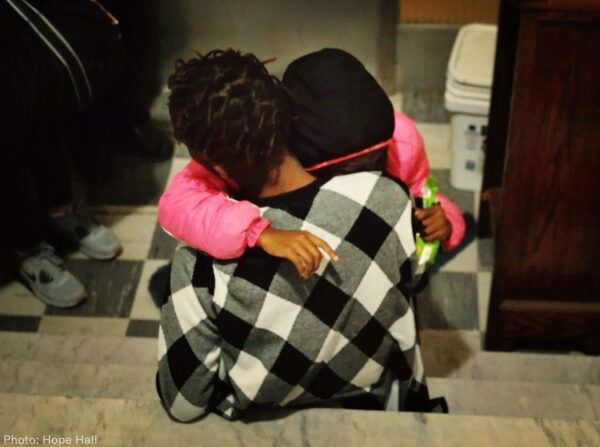
Sep 2024
Immigrants' Rights
Ms. L v. ICE
SETTLEMENT UPDATE: Sept. 26, 2024:
Attorneys Fees Settlement Agreement: https://www.aclu.org/documents/ms-l-attorneys-fees-settlement-agreement
Attorneys Fees Class Notice (English): https://www.aclu.org/documents/ms-l-attorneys-fees-class-notice-english
Aviso de clase de La Resolución de honorarios (en español): https://www.aclu.org/documents/ms-l-attorneys-fees-class-notice-spanish
Attorneys Fees Unopposed Motion and Supporting Declarations: https://www.aclu.org/documents/ms-l-attorneys-fees-unopposed-motion-and-supporting-declarations
SETTLEMENT UPDATE: Dec.1, 2023
Here are links to the proposed family separation settlement and Notice of Rights in English and Spanish. The Notice of Rights explains the settlement and next steps to seek final approval of the settlement, including the opportunity to object:
Settlement Document: https://www.aclu.org/documents/ms-l-amended-settlement
Notice (English): https://www.aclu.org/documents/ms-l-v-ice-notice-english
Notice (Spanish): https://www.aclu.org/documents/ms-l-v-ice-notice-spanish
Explore case
Sep 2024

Immigrants' Rights
Ms. L v. ICE
SETTLEMENT UPDATE: Sept. 26, 2024:
Attorneys Fees Settlement Agreement: https://www.aclu.org/documents/ms-l-attorneys-fees-settlement-agreement
Attorneys Fees Class Notice (English): https://www.aclu.org/documents/ms-l-attorneys-fees-class-notice-english
Aviso de clase de La Resolución de honorarios (en español): https://www.aclu.org/documents/ms-l-attorneys-fees-class-notice-spanish
Attorneys Fees Unopposed Motion and Supporting Declarations: https://www.aclu.org/documents/ms-l-attorneys-fees-unopposed-motion-and-supporting-declarations
SETTLEMENT UPDATE: Dec.1, 2023
Here are links to the proposed family separation settlement and Notice of Rights in English and Spanish. The Notice of Rights explains the settlement and next steps to seek final approval of the settlement, including the opportunity to object:
Settlement Document: https://www.aclu.org/documents/ms-l-amended-settlement
Notice (English): https://www.aclu.org/documents/ms-l-v-ice-notice-english
Notice (Spanish): https://www.aclu.org/documents/ms-l-v-ice-notice-spanish
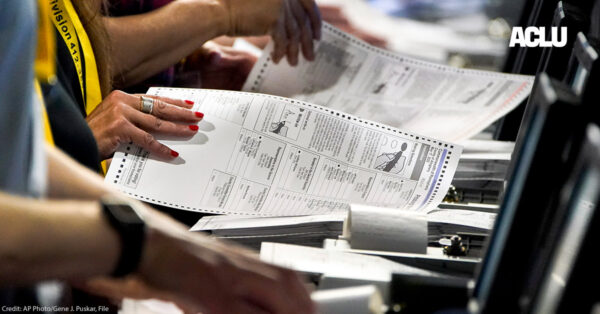
Pennsylvania Supreme Court
Sep 2024
Voting Rights
New PA Project Education Fund v. Schmidt
On September 25, 2024, 10 organizations filed a suit in the Pennsylvania Supreme Court, asking the court to stop enforcement of the commonwealth’s requirement that voters include an irrelevant handwritten date on the outer return envelope of their mail ballot packets or else be disenfranchised.
Explore case
Pennsylvania Supreme Court
Sep 2024

Voting Rights
New PA Project Education Fund v. Schmidt
On September 25, 2024, 10 organizations filed a suit in the Pennsylvania Supreme Court, asking the court to stop enforcement of the commonwealth’s requirement that voters include an irrelevant handwritten date on the outer return envelope of their mail ballot packets or else be disenfranchised.
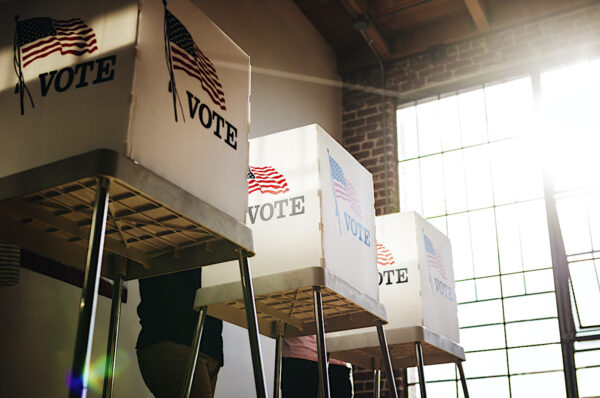
Georgia
Sep 2024
Voting Rights
Frazier v. Fulton County Department of Registration and Elections
The ACLU, along with several partner organizations, have intervened in this case to represent the rights of voters and voting-rights organizations in a case that asks a federal court to compel the purge of nearly 2,000 Fulton County, Georgia voters from the state’s rolls on the eve of a presidential election. The relief that the private plaintiffs seek is presumptively unlawful because this purge would happen within 90 days of a federal election, in violation of the National Voter Registration Act (“NVRA”).
Explore case
Georgia
Sep 2024

Voting Rights
Frazier v. Fulton County Department of Registration and Elections
The ACLU, along with several partner organizations, have intervened in this case to represent the rights of voters and voting-rights organizations in a case that asks a federal court to compel the purge of nearly 2,000 Fulton County, Georgia voters from the state’s rolls on the eve of a presidential election. The relief that the private plaintiffs seek is presumptively unlawful because this purge would happen within 90 days of a federal election, in violation of the National Voter Registration Act (“NVRA”).
